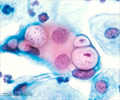Taking a major step in the research on HIV/AIDS, scientists have uncovered why prior infection by other sexually transmitted diseases (STDs) make individuals more susceptible to HIV infection.
Taking a major step in the research on HIV/AIDS, scientists have uncovered why prior infection by other sexually transmitted diseases (STDs) make individuals more susceptible to HIV infection.
Researchers have shown that HIV faces a genetic "bottleneck" when the virus is transmitted heterosexually from one person to another, by way of the genital mucosa.Led by Eric Hunter of Emory University, the research team identified 20 heterosexual couples soon after infection occurred and obtained viral genetic sequences from both partners.
They examined the most variable region of the virus' env gene, which encodes a protein forming the outer coat of the virus.
It was found that almost 90 percent of the couple recipients were infected by a single viral variant of HIV-1, but that variant was not the same in each case.
To compare the results, the researchers also analysed a group of newly infected individuals who were infected by someone other than their spouse. This group showed more variety in viral sequences, with 3 out of 7 individuals infected by multiple variants.
Overall, out of 42 newly infected people studied to date, all five infected by multiple viral variants had evidence of genital inflammation or ulceration.
Advertisement
The results indicate that the genital mucosa provides a natural barrier to infection by multiple genetic variants of HIV-1 that can be lowered by inflammatory genital infections.
Advertisement
Source-ANI
SRM














